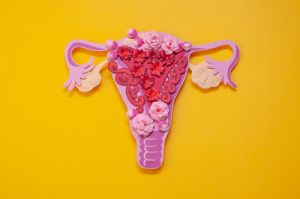As the number of women diagnosed with endometriosis rises, it’s important to determine if there may be a link with early menopause.
The age at which menstruation ceases can be affected by many factors, but hormones play an essential role. A woman’s hormone levels fluctuate during her life span, but they are closer to their peak in the years leading up to and through the reproductive period. So it stands to reason that if hormonal levels contribute more significantly to reproductive success than has been determined, too low a level could impact endometriosis development.
What Is Endometriosis?
Endometriosis occurs when endometrial tissue that usually lines the uterus begins growing outside of the uterus, causing pelvic pain and other symptoms. Endometrial tissue typically forms within the pelvis and implants itself in other body tissue, such as muscle, ligaments or organs.
The most common locations for endometrial tissue to grow are on the ovaries and in the ovary-like structures called the peritoneum (the ligament-like surface that surrounds organs) that line organs such as your intestines, lungs, heart and others. Endometrial tissue can also grow outside of the uterus on other pelvic structures.
Endometriosis and Early Menopause

It has been shown in many studies that endometrial tissue growth occurs exclusively in response to estrogen levels. Therefore, the early cessation of menstruation could result in a lack of estrogen levels needed to support endometrial tissue growth, leading to endometriosis.
Endometriosis and Early Menopause: What Is the Evidence?
Endometriosis has been linked to the early cessation of menstruation in two ways. First, women who undergo early menopause are at a higher risk of developing endometriosis. Second, women who have had a hysterectomy (procedure in which the uterus is removed) before they reach the age of 45 are 50% more likely to develop endometriosis than women who have it past their 45th birthday or never have one at all.
It’s known that endometrial tissue is the type of tissue that is most responsive to estrogen levels, which is why it has been linked to early menopause. However, what wasn’t known before this was if the normal endometrium found in younger women produced less estrogen or whether older women had higher estrogen levels.
Research has revealed that in both premenopausal and postmenopausal women, the cells in the uterus lining continue to respond to outside stimuli by producing estrogen. Therefore, it appears as though menopause itself doesn’t lead to a decrease in estrogen levels but rather an inability for those levels to cause proliferation of cells within the uterus, leading to endometriosis.
What Are the Implications?
For women, early menopause could result in endometrial tissues growing and potentially manifesting as endometriosis. For example, if a woman stops menstruating before she’s 40 years old because of a hysterectomy or other medical procedure and then later develops endometriosis, it is possible that her symptoms were due to the earlier-occurring hormonal changes caused by lack of estrogen.
Endometriosis may develop any time when estrogen levels, which are responsible for the menstrual cycle, fall independently. The timing cannot be precisely predicted, and it is not known when menstruation will stop due to low estrogen levels. This can still be the case after menopause, as women can also prevent endometriosis before it occurs, rather than only discovering the disease when symptoms become severe.
Scientists now agree that too low a level of hormones can cause endometriosis and early menopause. This is a significant leap forward in the effort to prevent and treat endometriosis, even before it occurs. It also raises awareness of the importance of early menopause detection and treatment to forestall the onset of endometriosis.





